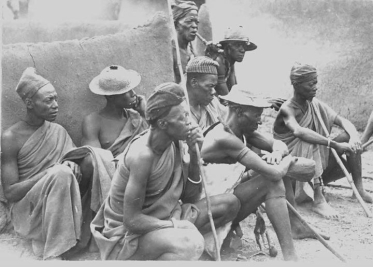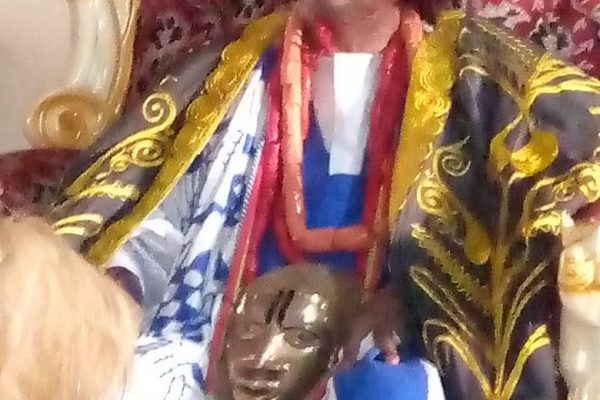In the Igala culture, certain solemn ceremonies are performed during the year in the practice of the people’s traditional, ancestral religion, called Ògwùchẹ́kwọ̣̀. Traditional rites are performed during a variety of social events, such as marriage, child-naming, dedication, funeral activities, conferment of titles, appeasement of spiritual entities and during festivals scheduled for both the rainy season and the dry season. The most common of Igala festivals are the Ìbégwú (Ancestral) and Ánẹ́ẹ̀ (Earth) Festivals. There are some festivals that are exclusively celebrated at Idah, the Igala capital, namely: Ócho, Ọ̀gbadù, Ọ̀ganyiganyi, Ọ́jọ́ Àmọmàtá and Inikpi. In the course of celebrating these festivals, specific rites are performed in order to maintain the balance of social peace and harmony. At personal level, an individual is, sometimes, required by the Ifa oracle to offer certain sacrifices to his or her personal god, Ọ́j́ọ́, or Ègbunu, Ìkpàkáchi, Óde-oji, Ẹ́bọ-ojí, all spiritual entities. Blood offerings, ranging from a four-legged animal to a hen or cockerel, tortoise, turtles, are made to them; sometimes, lizards (ògbèlè) are offered in the place of any of the items named.
Daily Rites
On daily basis, the head of a household, usually a man, before he takes his meal, reverently drops a morsel of ‘ọ̀jẹ̀,’ any of the swallowed foods, on the ground in front of him, muttering: “Mẹ gbà kú mẹ jẹ.” (You all, take this and eat), addressing them. In actual fact, he believes that a clan of ancestors (Àmiìbégwú) will troop to his house and share that meal with him. In the same vein, before he takes a sip of any drink, even of water, he respectfully spills some on the ground beside him.
Calling an Ancestor’s Name
It is also typical of an Igala man to observe a verbal rite of affectionately mentioning an ancestor’s name, when a shocking and untoward incident occurs, like a sudden death or other tragedy. He is wont to exclaim: “Hé-è-! Òkóliko àtá mi!” (Oh! Òkólíko, my father!” or “È-é-ẹ́, Ọ̀gẹ̀nẹ́ iye mi!” (Pity, Ọ̀gẹ̀nẹ́, my mother!” and so on. This usage underscores the familiarity that exists between the individual traditionalist and his ancestors who he believes is alive (even in death) and a helpful companion.
Morning Òkwùtẹ̀ Rite
The unwritten Igala kingship constitution provides that every Àtá–Igala (Igala monarch) must perform the ‘Òkwùtẹ̀ Rite,’ every morning before he takes his breakfast. He is duty-bound to offer healthy kola-nuts and fresh, home-brewed corn-beer (ọ́tẹ́-ọkà) to the gods of the land and the spirits of his ancestors and predecessors. Nine ritual staffs (òkwùtẹ̀), representing the nine previous kings, are leaned on the wall and, the Ata, lifting a matching staff, mentions each ancestor’s name before making the offerings to him.
According to Miles Clifford, “A Nigerian Chiefdom: Some Notes on the Igala Tribe in Nigeria and Their Divine- King” (p. 417-418), the Ata’s supplication goes like this: “The sun has arisen and I come, as is our custom, to greet you and bid you good health. If, oh ancestors, I am doing that which was done afore-time, and if I am your lawful successor, do then accept my offering and give heed to my prayer. Give health to my people; temper the seasons to our need, that the earth may bring forth crops in abundance. May our women be fruitful; keep evil and misfortune from us.”
Èkwé, Head of Igala Incarnate Beings

The Èkwé Incarnate Being, is not only the Head of the Ata’s nine Royal Incarnate Beings but also all other such beings in the entire Igala kingdom. Èkwé is a symbolic representation of the collective ancestors of the Igala people, just as the Ata’s person epitomizes the cultural and secular values of the kingdom, while being the bridge between the worlds of the living and the dead.









